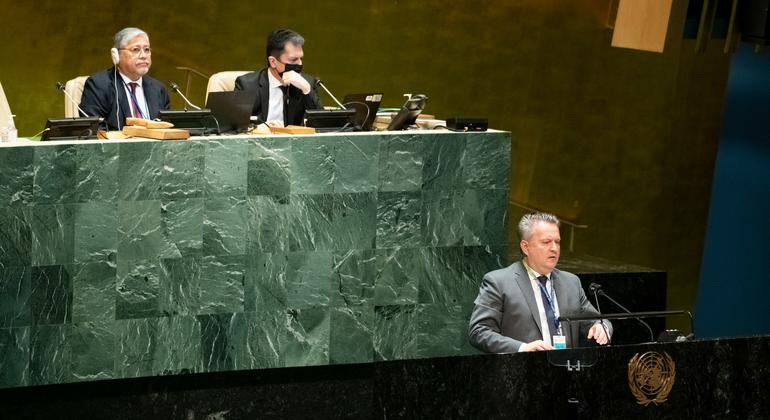The first resolution, put forward by Ukraine and other Member States, Humanitarian consequences of the aggression against Ukraine, calls out Russia’s assault on Ukraine for creating the “dire” humanitarian situation, pushes for a humanitarian corridor, and demands that fighting stops and troops are withdrawn.
Supporters of that draft, hope to build on the resolution that deplored Russia’s “aggression against Ukraine,” which was adopted on 2 March by 141 votes in favour, while five countries – Russia, Belarus, Eritrea, the Democratic People’s Republic of Korea and Syria – voted against. A total of 35 countries, including China, abstained.
At the same time South Africa has proposed a rival draft text for consideration on Wednesday, entitled Humanitarian situation emanating out of the conflict in Ukraine that makes no reference in its text, to Russia.
Murder not ‘trivialized’
Speaking in the Assembly Hall, Ukraine’s Ambassador, Sergiy Kyslytsya, criticized what he called Russia’s “unprovoked and unjustified war” that has “split into two parts” the lives of millions of his compatriots.
He painted a grim picture of people starving, cities razed and neighbouring countries, which are providing relief, stretched to their limits.
“In a nutshell – it has already reached the level of humanitarian disaster,” he said.
Noting that “eight dozen countries have already cosponsored” the draft resolution penned by France and Mexico, he said that countries voting in favour would send “a powerful message” towards “a breakthrough in humanitarian action on the ground.”
Mr. Kyslytsya appealed for support “to prevent a spillover effect for the entire world.”
Another ‘heart-breaking’ catastrophe
Ambassador Olof Skoog, Head of the 27-member European Union (EU) delegation – which includes most of the frontline countries taking in millions of Ukrainian refugees – said it was “heart-breaking to see yet another humanitarian catastrophe unfolding before our eyes,” in addition to those in Afghanistan, Syria, Yemen, Ethiopia, Sudan, and other parts of the world.
“Instead of joining international efforts to heal existing wounds, Russia is opening new ones”, he stated.
Calling it “the fastest growing refugee crisis in Europe since World War Two,” Mr. Skoog informed the Assembly that EU States have kept their borders open for everyone fleeing the war, “regardless of nationality, ethnicity, religion or race.”
Meanwhile, beyond Europe, the conflict is putting millions at risk of food insecurity as many countries import at least half their wheat from Russia or Ukraine.
“Russia must stop this war and end this unnecessary suffering,” he said, reiterating that Moscow cease military action and “withdraw all forces from the entire territory of Ukraine, immediately and unconditionally.”
Fleeing to Poland
Polish Ambassador Joanna Skoczek reminded that the humanitarian consequences are not limited to Ukrainians in their home country.
Noting that 2.2 million of them have now fled to Poland, she described a “constant inflow” of “severely traumatized” people seeking safety in her country.
“We have registered already 170 nationalities on our border. The consequences of Russia’s invasion on Ukraine are being felt in almost every country around the globe. It affects Ukraine, it affects Europe, it affects us all,” Ms. Skoczek spelled out.
‘False’ picture
Russian Ambassadsor Vasily Nebenzya said that the Franco-Mexican text painted “a false, one-dimensional picture” of what is happening, ignoring the causes of Ukraine’s crisis and the West’s role in using the country as a pawn “in a geopolitical game against Russia.”
He called on “all right-minded countries” to support instead, the draft proposed by South Africa, which contains, he said, no political elements.
Supporting that text would not only “signal to civilians in Ukraine that the UN is aware of their difficult situation and is trying to help them”, but also offers an “opportunity to take a stance on the unprecedented economic and political pressure” that many countries are facing, due to Western pressure.
